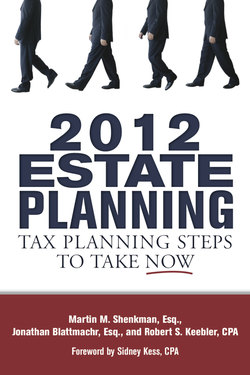Читать книгу 2012 Estate Planning - Martin Inc. Shenkman - Страница 48
На сайте Литреса книга снята с продажи.
INCOME TAX CHANGES VITAL TO CONSIDER
ОглавлениеA host of income, retirement plan, and other tax changes are up for consideration. The political environment, however, makes guessing at the outcome pretty tough. While President Obama has made it clear that he believes that wealthier taxpayers (e.g., individuals earning more than $200,000 and couples earning more than $250,000) should pay higher income taxes, the Republicans, and even many Democrats, have taken opposing views. Whether tax rates will rise in 2013, or later years, if they do rise, at what thresholds they will increase and a myriad of other issues are all open for speculation. What will happen with capital gains, dividends, interest, and other forms of income? The range of proposals that have been discussed is varied, and the impact on wealthy or high-income taxpayers (however that concept is ultimately defined) can be dramatic. Unfortunately, with so much uncertainty, what can taxpayers realistically do to plan? Perhaps, the paradigm to evaluate whether action should be taken can be viewed in a similar light to that discussed previously concerning planning for possible transfer tax changes. You should evaluate the cost of planning, as compared to the possible benefits on each end of the possible tax law change continuum. In many cases, the benefits of planning today will far outweigh the time and costs involved. In other cases, it may not, in which case you should perhaps opt for a lesser degree of planning (e.g., harvest a portion of capital gains before year end instead of all). Likely, for most taxpayers, some action in 2012 will make sense. But as with all planning in 2012, there are no guarantees. Even the Yankees don’t win every game.
Although estate planning is the focus of this book, estate planning is often part of a comprehensive overall plan that integrates a wide array of goals and objectives, and considers all relevant factors. A common goal of most taxpayers is to minimize all taxes, not just estate and gift taxes. Further, many of the income and business tax changes that are being discussed in Washington could have a rather profound impact on estate planning.
EXAMPLE: You are 85 years old, own a highly appreciated stock portfolio worth $4 million, and have no other assets. You reside in a state that has decoupled from the federal estate tax system and has a $1 million state estate tax exemption. If capital gains rates remain the same after this year, there may be no benefit to harvesting gains in 2012. If instead capital gains rates increase substantially in future years, and in 2012 gain harvesting is not pursued, the costs could be significant. Given your age, however, it might be advantageous to gift away much of your estate to your heirs in order to remove the assets from your estate and minimize state estate tax on your death. However, the gifted securities will have a “carryover” basis (the same basis on which gain is calculated on sale as you have) to the recipients of the gifts so that, if they sell the stock in future years, they could face higher capital gains taxes. The 3.8 percent Medicare tax on passive investment income (see below) might make the marginal capital gains cost on gifted assets outweigh the potential state estate tax savings as a result of the gift. But to better evaluate these options, the possible future tax status of the donees should be considered as well.
The myriad of variables, most of which are uncertain, make the analysis for many taxpayers exceedingly complicated. But the interplay of the income tax and transfer tax planning should not be ignored whatever analysis is undertaken. Perhaps you should sell some or all of your appreciated portfolio in 2012 in order to lock-in what may be a lower capital gains rate, reduce your taxable estate by the resulting capital gains tax, and then gift the proceeds to your heirs in order to minimize state death tax. Perhaps not.
The following discussion provides an overview of some of the many possible changes and some indication of the estate and general planning implications they might have.
The key open issue is what will happen if in 2013 the Bush tax cuts (originally enacted in 2001 as part of EGTRRA, and then extended by the 2010 Act to the end of 2012) are allowed to expire. While many politicians are adamant that it would be devastating to the tepid economic recovery, President Obama has made it clear he favors letting some portion of the Bush tax cuts expire for the wealthiest taxpayers.
